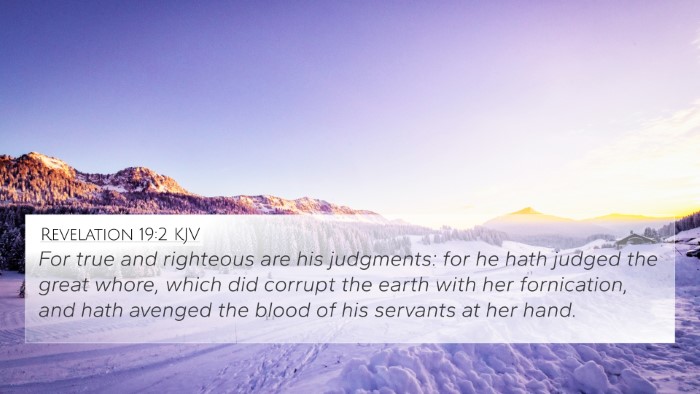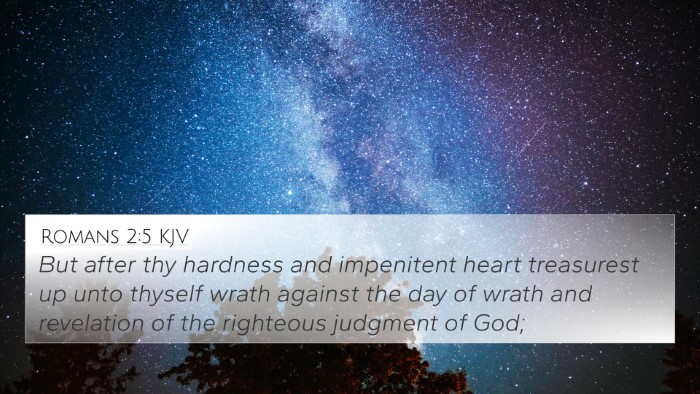Understanding Psalms 50:6
Psalms 50:6 states, "And the heavens declare His righteousness, for God Himself is judge." This verse emphasizes the divine judgment and the righteousness of God as perceived not only through creation but also through His authoritative governance over all things.
Summary of Biblical Meaning
This verse is framed within the overarching themes of God's sovereignty and righteousness. The phrase "the heavens declare" points to the idea that creation itself bears witness to God's glory and justice. Public domain commentaries by Matthew Henry, Albert Barnes, and Adam Clarke provide rich insights into the implications of this scripture.
Insights from Commentaries
-
Matthew Henry:
Henry indicates that the declaration of God’s righteousness by the heavens serves as an invitation for humanity to recognize divine authority. It affirms that God will judge the world in righteousness, highlighting the futility of human pride against divine moral order.
-
Albert Barnes:
Barnes draws attention to the universal scope of God’s judgment, emphasizing that no man can escape the scrutiny of the Creator. The heavens, in declaring God’s righteousness, serve to remind believers of their moral obligations and the certainty of divine justice.
-
Adam Clarke:
Clarke discusses how the declaration of the heavens not only serves as a testament to God's righteousness but also establishes a relationship between creation and the moral laws inherent within. He encourages readers to see this declaration as an underlying call to repentance and recognition of divine authority.
Thematic Connections
Psalms 50:6 stands at the intersection of several profound biblical themes including justice, authority, and creation. Below are thematic connections and biblical cross-references that resonate with this verse:
Related Bible Cross References
- Romans 1:20: For since the creation of the world God's invisible qualities—his eternal power and divine nature—have been clearly seen, being understood from what has been made, so that people are without excuse.
- Psalm 97:6: The heavens proclaim his righteousness, and all peoples see his glory.
- Hebrews 10:30: For we know him who said, "It is mine to avenge; I will repay," and again, "The Lord will judge his people."
- Isaiah 40:10: See, the Sovereign Lord comes with power, and he rules with a mighty arm; see, his reward is with him, and his recompense accompanies him.
- Matthew 12:36: But I tell you that everyone will have to give account on the day of judgment for every empty word they have spoken.
- 2 Peter 3:7: By the same word the present heavens and earth are reserved for fire, being kept for the day of judgment and destruction of the ungodly.
- Psalm 9:7-8: The Lord reigns forever; he has established his throne for judgment. He rules the world in righteousness and judges the peoples with equity.
The Importance of Cross-Referencing
To fully grasp the implications of Psalms 50:6, utilizing a Bible cross-reference guide can significantly enhance understanding. By examining the connections between Bible verses, one can gain deeper insights into themes of divine judgment and righteousness that span across both the Old and New Testament.
Tools for Bible Cross-Referencing
- Bible Concordance: A tool that lists words and phrases from scripture, helping users locate verses related to specific topics.
- Bible Cross-Reference System: A method for linking verses that discuss similar themes or provide commentary on one another.
- Cross-Referencing Bible Study Methods: Techniques for studying scripture that look for parallels between various biblical texts.
- Bible Reference Resources: Helps in discovering related verses to enhance personal or group study sessions.
Conclusion
Psalms 50:6 serves as a profound reminder of God's righteousness and judgment, reflected in the heavens. Cross-referencing this verse with related scripture deepens the understanding of God's moral authority and the invitation for humanity to acknowledge His divine sovereignty. Through tools for cross-referencing, believers are encouraged to explore the rich tapestry of connections within the biblical text.















